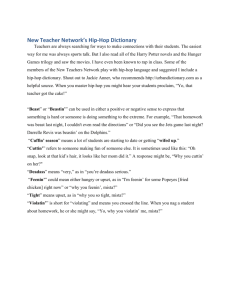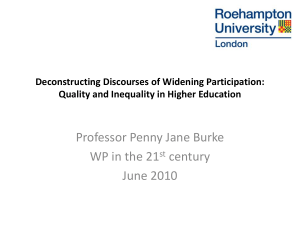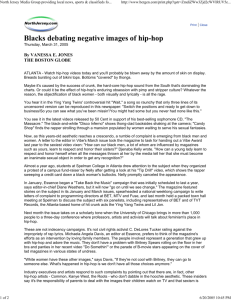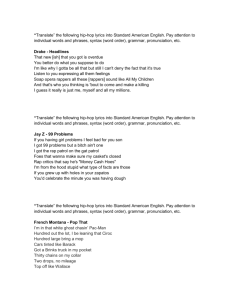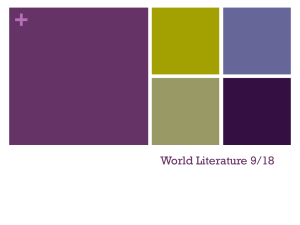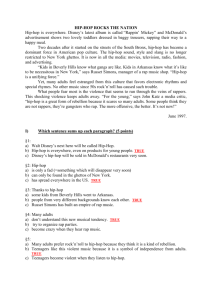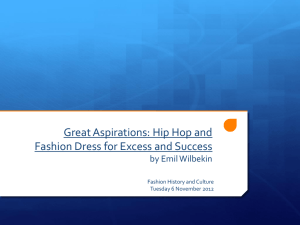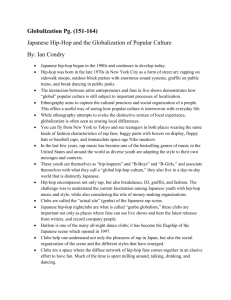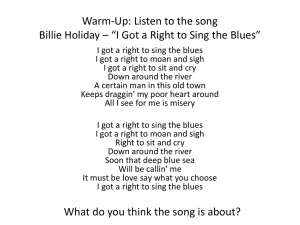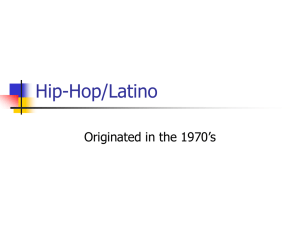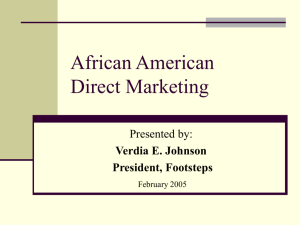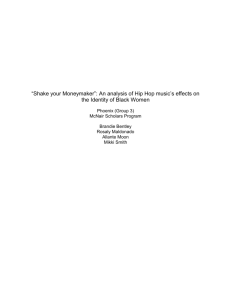Hip-Hop Nation - Drury University
advertisement
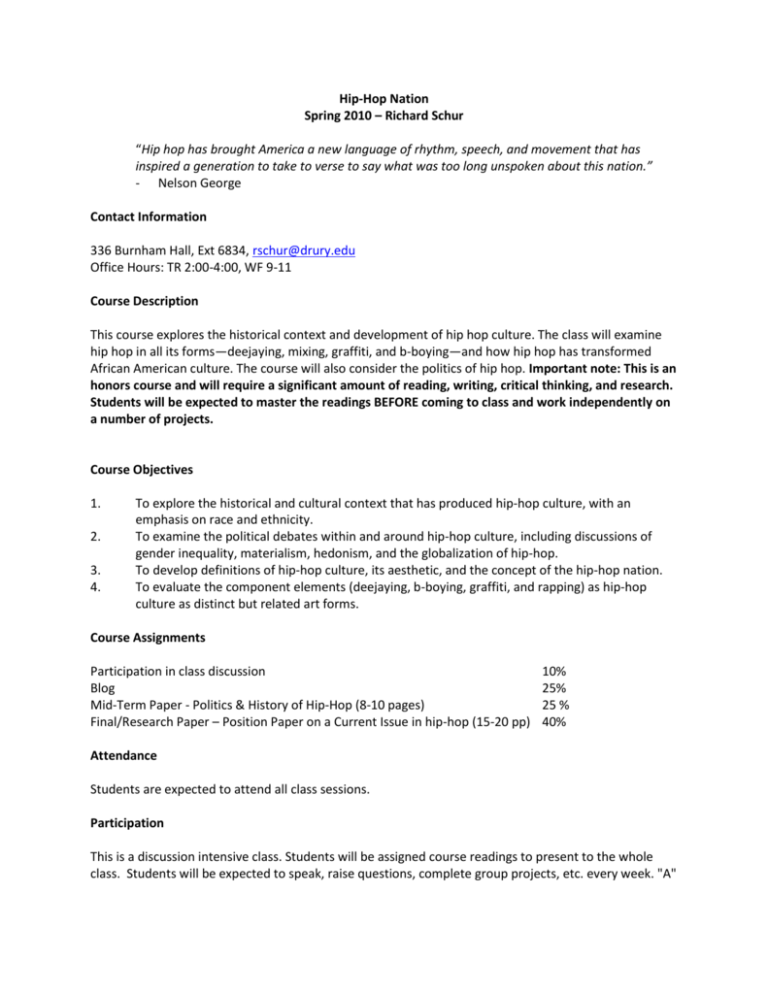
Hip-Hop Nation Spring 2010 – Richard Schur “Hip hop has brought America a new language of rhythm, speech, and movement that has inspired a generation to take to verse to say what was too long unspoken about this nation.” - Nelson George Contact Information 336 Burnham Hall, Ext 6834, rschur@drury.edu Office Hours: TR 2:00-4:00, WF 9-11 Course Description This course explores the historical context and development of hip hop culture. The class will examine hip hop in all its forms—deejaying, mixing, graffiti, and b-boying—and how hip hop has transformed African American culture. The course will also consider the politics of hip hop. Important note: This is an honors course and will require a significant amount of reading, writing, critical thinking, and research. Students will be expected to master the readings BEFORE coming to class and work independently on a number of projects. Course Objectives 1. 2. 3. 4. To explore the historical and cultural context that has produced hip-hop culture, with an emphasis on race and ethnicity. To examine the political debates within and around hip-hop culture, including discussions of gender inequality, materialism, hedonism, and the globalization of hip-hop. To develop definitions of hip-hop culture, its aesthetic, and the concept of the hip-hop nation. To evaluate the component elements (deejaying, b-boying, graffiti, and rapping) as hip-hop culture as distinct but related art forms. Course Assignments Participation in class discussion Blog Mid-Term Paper - Politics & History of Hip-Hop (8-10 pages) Final/Research Paper – Position Paper on a Current Issue in hip-hop (15-20 pp) 10% 25% 25 % 40% Attendance Students are expected to attend all class sessions. Participation This is a discussion intensive class. Students will be assigned course readings to present to the whole class. Students will be expected to speak, raise questions, complete group projects, etc. every week. "A" level participation will meet this expectation by participating in a reasonable manner1 each week. "B" level participation would be evidenced by regular participation, but perhaps not each week. "C" level participation is evidenced by occasional talking in class. "D" or "F" grades are reserved for student who do not speak in class or speak infrequently. Because this class will meet in one three hour block, I am anticipating that we will use 30-45 minutes to listen to music and/or watch films that pertain to that week’s readings. My hope is that students will bring in their own music and offer suggestions for things that they want me to bring or show. We will need to figure this out as we go along! I do expect that students will take an active role in shaping this visual and audio portion of the class! Student Blog Each student will create a blog about the course readings. This is informal and reflective writing in which you are expected to develop your thoughts about a course-related topic or issue over the course of your writing. By every Sunday at 9:00 pm, students must (1) post a 300-400 word response to the week’s readings and (2) comment (50 words minimum) on two student posts. Our class discussion will begin with a review of our class’s blogs. We will use those posts to ask questions and move our conversation about the novels forward. The student blog will run most of the semester. As we near the end, the class may decide when we need to move away from blogging to focus more on our final paper. The blogs will be graded on a pretty basic template. Students can receive one point for submitting your response (must meet minimum length standards) on time. Students will receive one point for a response that demonstrates a basic understanding of the novel’s plot and tries to make a specific point about the book. For responses that are exceptionally thought-provoking, they will receive an extra point. Students will also receive for one point if they make two comments on classmates’ responses in a timely fashion. For strong comments, students can earn an additional point for the week. The maximum points a student can earn for a given week is 5, with most students earning 3 in a given week. Blog details - you can get your blog hosted anywhere. I just started a free blog at blogspot.com. Once I create a gmail account, it took my about 30-40 minutes to get mine setup. Blogspot was really easy. I have heard that wordpress.org is really easy too. Once you create your blog, you will need to send me a link to it, which I will then forward to the class. You will need to get your blog set-up before the first class! Although I am pretty new to the whole blog thing, I will try to help you the best I can. I suspect that you will find it pretty easy to arrange. Papers All written work must be edited, spell-checked, and typed prior to being submitted. Because the Drury community places a high value on academic integrity, plagiarism in any form is prohibited and all sources (even for paraphrases and statistics) must be identified and cited properly. Plagiarism, in any form, may be grounds for failing an assignment (or lowering a grade) and, if repeated, failing the course. All instances of plagiarism will be documented and forwarded to the Dean's Office. A first incident will result in a failing grade on the assignment. A second incident may result in a failing grade for the course and expulsion from Drury. More details about the specific paper topics will be provided 1 A "reasonable manner" means that the participation is on-topic, respectful, and indicates that the student has read the assigned reading. in class Grading Scale 92% or higher 90 - 91.99% 88 - 89.99% 82 - 86.99% 80 - 81.99% 78 - 79.99% 72 - 76.99% 70 - 71.99% 68 - 69.99% 62 - 66.99% 60 - 61.99% A AB+ B BC+ C CD+ D D- My Teaching Philosophy My goal in teaching is to create opportunities for students to reflect on contemporary social issues based on the methodology and subject-matter of the course. I want students to enter current debates, become socially engaged, identify their values, and find ways to put those ideas into action. Based on my many years of teaching and writing about African American culture, I have come to think of learning as sharing basic elements from African American music: harmonization, call and response, and improvisation. First, I consider the importance of harmony within intellectual inquiry. The slave songs or spirituals emphasized building community as singers worked to blend and harmonize their voices together. Through the act of singing, participants created a social network and fostered group solidarity. It also was a way to honor and participate in a historical tradition. I want students to become skilled at listening to other voices, including their classmates and the writers we read, so that they can learn how to add their voice to a cause or argument. I want students to understand that learning is not solitary, but social and potentially liberating due to its power of building or fostering community. Second, I rely on the blues to consider the classroom experience as series of calls and responses. On one level, education requires a steady dialogue between people, cultures, and ideas. On a deeper level, education is fundamentally about creating useful knowledge that can be applied to discrete situations. Learning must grow organically from the "calls" or challenges issued by current events. As individuals, we are measured or valued by the quality of our response to those “calls”. Third, the jazz emphasis on improvisation provides a ready metaphor for encouraging students to reshape the material and make it their own. The best jazz tunes, like the best student papers, provide a basic rhythmic (i.e., timeline) and melodic (i.e., subject matter) structure onto which players or students can stamp their own personality. Creating opportunities for students to “solo” allows them to find their voice and shape historical or ongoing debates based on their own experiences and ideas. However, like in jazz, in order to earn the “right to improvise,” an individual must demonstrate mastery of the received tradition. For me, teaching and learning are about engaging in reflection and debate so that we can make a better world. Although music is frequently viewed as mere entertainment, I have found that its methods and forms offer tremendous insight for creating potentially transformative educational experiences, which can help students find their voices. A Note about Language Given the course’s subject-matter, one of the first issues we will need to consider is how language matters. While hip-hop regularly employs variants of the “N-word,” we will NOT be employing these words in class discussions. These words have histories and frequently invoke, intentionally or not, a history of racism. We can and should explore this history and learn their multiple meanings and how they are used in contemporary African American culture. However, we must do so in a way that is respectful to all students. I am paraphrasing but Jay Z, for example, has stated repeatedly that white listeners should not even sing the the “N-word” when listening to his music. Similarly, we will encounter various dialects (i.e. not “standard” English) over the semester. I urge students to be extremely careful when using it. Language is kind of like a knife. In the hands of a surgeon it can be used to heal wounds, but in other hands that same knife can result in serious injury. Perhaps more than in any other class, you will need to choose your language carefully. Statement Regarding Students with Disabilities Drury University is committed to making reasonable efforts to assist individuals with a disability in their efforts to avail themselves of services and programs offered by the University. Drury University will provide reasonable accommodations for persons with documented qualifying disabilities. It is the student’s responsibility to request accommodations. To receive accommodations please contact Ed Derr in the Disability Support Services Office, Findlay Student Center, room 1116, 417-873-7457, ederr@drury.edu. Texts : Henry Chalfant, Spraycan Art Michael Eric Dyson, Know What I Mean? Murray Forman & Mark Anthony Neal, That’s the Joint! Joan Morgan, When Chickenheads Come Home to Roost Imani Perry, Prophets of the Hood Joseph Schloss, Foundation Toure, Never Drank the Kool-aid Other Readings assigned below (either sent out as PDF, weblinks or physical handouts) COURSE CALENDAR Hip-Hop History/Culture Week One (Jan 25) Syllabus Know What I Mean xii-xviii That’s the Joint 1-9, 21-55 Selection from Yes, Yes Y’all 25-63 (pdf/handout) Week Two Selection from Can’t Stop, Won’t Stop 7-21 & 67-85 (pdf/handout) That’s the Joint 69-86, 95-104, & 119-157 Regina Blackburn “Binary Visions, Black Consciousness, and Bling Bling” Socialism and Democracy 18.2 (July-December 2004) 79-105 Week Three Never Drank the Kool-Aid 1-74, 80-116 Carl Hancock Rux “Eminem: the White Negro” 15-38 (handout) Week Four Never Drank the Kool-Aid 117-124, 160-205, 233-247, 297-313, & 333-354 Politics of Hip-Hop Week Five That’s the Joint! 307-388 James Stewart “Message in the Music” Journal of African American History 90.3 (Summer 2005) 196-225. http://www.jstor.org/stable/pdfplus/20063998.pdf Derrick Alridge “From Civil Rights to Hip-Hop” Journal of African American History 90.3 (Summer 2005) 226-252 http://www.jstor.org/stable/pdfplus/20063999.pdf Week Six Know What I Mean? (whole book) Elements & Aesthetics of Hip-Hop Culture Week Seven Prophets of the Hood 1-58 Selection from Parodies of Ownership 42-67 Murray Forman, “No Sleep Til Brooklyn” American Quarterly 54.1 (2002) 101-127. http://muse.jhu.edu/journals/american_quarterly/v054/54.1forman.pdf Deejaying Week Eight That’s the Joint! 389-437, 443-458, & 481-492 Selection from Making Beats 25-61 Rapping (and other linguistic Word Play) Week Nine Prophets of the Hood 59-203 Week Ten Selections from Book of Rhymes 49-117 Selections from Roc the Mic Right 1-19 & 69-107 Stephen Lester Thompson, “Knowwhatumsayin’? How Hip-Hop Lyrics Mean” Hip Hop & Philosophy: Rhyme 2 Reason. Ed Derrick Darby and Tommie Shelby. Chicago: Open Court, 2005. 119-132. Graffiti (& Contemporary African American Art) Week Eleven Spraycan Art Review That’s the Joint! 21-29 Selections from Total Chaos 102-132 Michelle Washington ”Shaping the New Language of Visual Culture” International Review of African American Art 20.2. 12-15 Richard Schur, “Post-Soul Aesthetics in Contemporary African American Art” African American Review 41.4 (Winter 2007) 641-654. (http://findarticles.com/p/articles/mi_m2838/is_4_41/ai_n30985848/pg_2/?tag=content;col1) B-Boying Week Twelve Foundation Review That’s the Joint! 13-20 & 31-40 Conclusion or the Ongoing Debate? Gender & Hip-Hop Week Thirteen When Chickenheads Come Home To Roost That’s the Joint! 251-276 & 283-289 Review Prophets of the Hood 117-191 & Know What I Mean? 89-152 Commercialization of Hip-Hop Week Fourteen Mark Anthony Neal “Up from Hustling: Power, Plantations, and the Hip-Hop Mogul” Socialism and Democracy 18.2 (July-December 2004) 157-182. That’s the Joint! 497-504 & 525-591 Globalization of Hip-Hop Week Fifteen That’s the Joint! 177-199 Josh Kun, “What Is an MC If He Can't Rap to Banda? Making Music in Nuevo L.A.” American Quarterly 56.3 (2004) 741-758. http://muse.jhu.edu/journals/american_quarterly/v056/56.3kun.pdf Selection from Total Chaos 262-270 & 278-290
